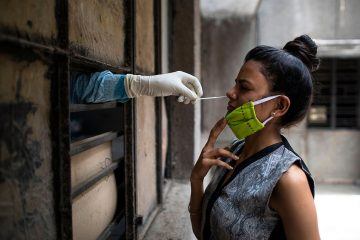Giorgia Guglielmi in Nature:
 The timing couldn’t have been worse. In March, just as Thailand’s coronavirus outbreak began to ramp up, three hospitals in Bangkok announced that they had suspended testing for the virus because they had run out of reagents. Thai researchers rushed to help the country’s clinical laboratories meet the demand. Looking for affordable and easy-to-use tests, systems biologist Chayasith (Tao) Uttamapinant at the Vidyasirimedhi Institute of Science and Technology in Rayong reached out to an old acquaintance: CRISPR co-discoverer Feng Zhang, who had been developing an assay for the coronavirus inspired by the gene-editing technology.
The timing couldn’t have been worse. In March, just as Thailand’s coronavirus outbreak began to ramp up, three hospitals in Bangkok announced that they had suspended testing for the virus because they had run out of reagents. Thai researchers rushed to help the country’s clinical laboratories meet the demand. Looking for affordable and easy-to-use tests, systems biologist Chayasith (Tao) Uttamapinant at the Vidyasirimedhi Institute of Science and Technology in Rayong reached out to an old acquaintance: CRISPR co-discoverer Feng Zhang, who had been developing an assay for the coronavirus inspired by the gene-editing technology.
Within days, Uttamapinant received starter kits from Zhang’s lab at the Broad Institute of MIT and Harvard in Cambridge, Massachusetts, and tested them on samples from a hospital in Bangkok. “The kits are quite cheap and work well,” says Uttamapinant, who hopes to get the test approved for clinical use by the end of the year. He has teamed up with biochemists in Thailand to produce the testing reagents locally, with Zhang on standby for support. “This effort to produce everything locally will have a lasting impact on infectious-disease monitoring and diagnosis in this part of the globe,” says Uttamapinant. Epidemiologists say mass testing for SARS-CoV-2 — requiring millions of tests per country per week — is the most practical way out of the current crisis. It allows officials to isolate those who test positive, limit the spread of disease and help to determine when it is safe to relax restrictions.
But countries are struggling to ramp up testing. One reason is that the standard test to detect SARS-CoV-2 — based on a mainstay lab technique called the reverse-transcription polymerase chain reaction, or RT-PCR — requires trained personnel, specific chemical supplies and expensive instruments that take hours to provide results and are often available only in labs that provide routine, centralized services. This limits the number of tests that can be done, especially in developing countries. Even in wealthy regions such as the United States, providers have reported a severe shortage of test kits and required materials — from nose swabs to chemical reagents — because of supply-chain problems. Scaling up reliable tests quickly has proved challenging, too: early RT-PCR tests developed by the US Centers for Disease Control and Prevention malfunctioned, for example, leading to a series of delays.
Research groups around the world are now devising tests that go beyond PCR.
More here.
